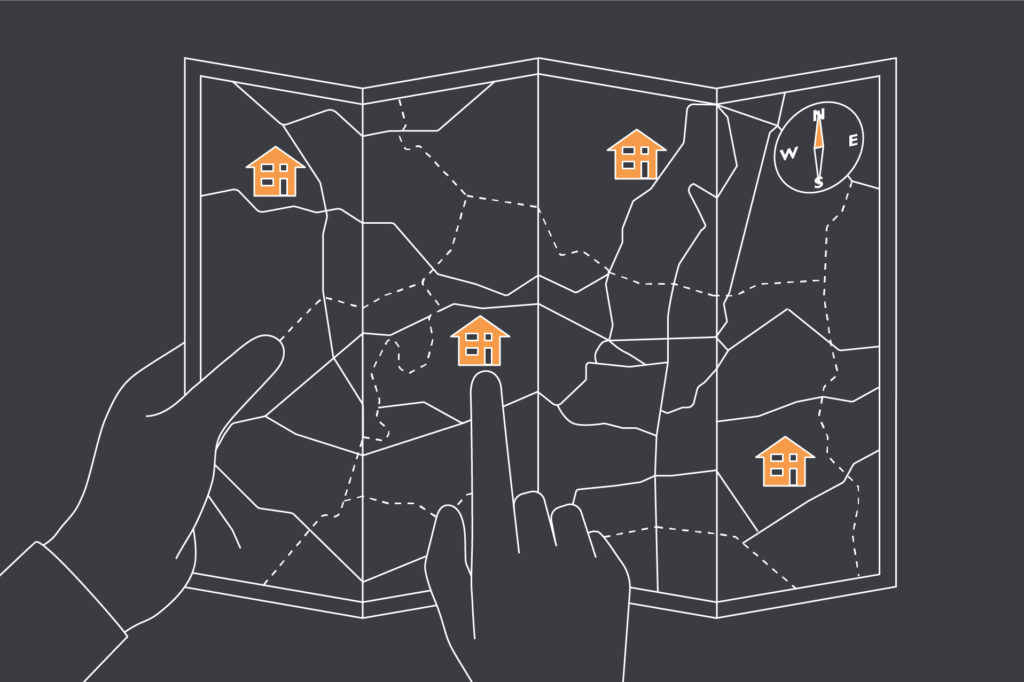Good afternoon and welcome to the Davies & Davies couple’s guide to buying or renting with your partner. Yes, that is a genuine velvet couch on which you may unleash your innermost worries. Now, what seems to be troubling you? The stress of a move that’s making you both feel overwhelmed? The impending inevitability of loss looming above your heads like the Sword of Damocles? Your curtains don’t match his drapes? These are common concerns.
Focus on communication
The answers, as always, lie in communication. At the heart of this article is the advice to listen to each other. Air out your worries before you set sail on a move. With your property plan of action based on mutual agreement and trust, you’ll be signing your papers with a smile (not a hidden worried frown). Avoid all that heartache and financial headache with our handy guide to buying or renting with your partner.

Get honest… about your bank account
When you and your partner decide to get a joint mortgage or rent that one bed together, there is a whole host of fiddly things to consider. While it is a happy time making that leap into shared resources / shared bedding, some recent research by Zoopla found that almost 75% of homeowners didn’t know how much their partners had saved. 45% were unaware if their partner was in debt, and nearly a third didn’t even know what their partner was making annually.
While it’s cool to keep some things a mystery, maybe that’s best left to your knicker drawer rather than your wallet. It is important to be aware of what each person brings to the mortgage application or tenancy agreement when it comes to credit history and past borrowing. If this information is hidden from one another, it can lead to arguments, financial loss and worse down the line.
Remember, financial transparency is essential for a healthy relationship, especially when making such an expensive investment together. So come on! Log into your internet banking and whip off that privacy setting. Transparency is sexy!
Tenants in common or tenants in love?
When you purchase a property with someone, there are two ways of owning it. No we don’t mean spinning the house keys on your finger and sashaying down the hall like you own the place shouting ‘own it girlfriend!’ What we’re referring to is property ownership. “Joint tenants” and “tenants in common” are two very different sides of the same coin. It matters which one you pick, as it will determine what happens to the house if the two of you part ways or one of you (sorry, god forbid) should die.
When chosen as joint tenants, each of you holds equal rights to the entire property. This is regardless of who has contributed more financially. In addition, if one of you dies, the home automatically goes to the other partner. This means that they cannot bequeath their stake of ownership to someone else within their will.
Alternatively, when electing for tenants in common, each can own different proportions of the home. They can pass on their share upon death (as stipulated by your will). This option is more flexible. It’s particularly useful for couples who aren’t married, or have different contribution levels. Or for those who want to keep things casual. For now. RED FLAG. Ahem, moving on…
A deed of trust (fall)
Now, if one of you has paid more or all of a deposit when it comes to buying or renting with your partner, you could be at risk of losing your money if the relationship should end. You might want legal assurance that the division of property ownership will be respected if you have an agreement in place.
A deed of trust or cohabitation agreement could be your answer! In some cases, you might decide to go Dutch and equally split the deposit, then pay different amounts towards monthly mortgage payments or rent based on your income.
A brilliant solution to salary discrepancies. It’s important to consider whether one partner should receive more credit for their contribution. As consumer expert at Zoopla, Daniel Copley states, “one half of the couple may pay the entire deposit, but mortgage payments may be split 50/50. In these situations, the person who has contributed more to the deposit may want to protect this.”
The deed of trust – or declaration of trust – is a legal document that outlines specifics such as financial contributions and property division in case of separation or divorce. It provides clarity on both partners’ financial commitments and responsibilities from the start.
For unmarried couples, a cohabitation agreement not only highlights shared possessions but also takes into account other finances and any children in case of breakup, illness, or death. Yes, it’s not exactly what you wanted to chat about over your Eggs Benedict this morning, but it’ll avoid a lot of heartache down the line! Now chins up you two, your flat whites are getting cold.
Time to talk to a professional (in property)
While purchasing a home is almost as much of a commitment as marriage—that’s what 85% of people polled said according to Zoopla’s research, it’s equally monumental to rent a property together. Your possessions slowly merge, your house plants create their own ecosystem together, and your finances are mushed together in a tangled web of credit histories and bank statements. So taking this next step is a radical act of love and commitment that requires trust and transparency.
If it all feels a little overwhelming (and beautifully romantic), you might like to speak to an expert who can provide insights about the best way to forge ahead in case something unexpected happens. It’s the old ‘what ifs’ chat. Consider writing up an agreement about what to do in the case of a financial SURPRISE, such as an inheritance, or redundancy. Addressing the heavy topics now can make light work of your domestic bliss down the line.
And how does that make you feel (to talk about finances)?
Hashing out your bank statements over a Marks and Sparks roast chicken for two might not be what you had in mind for Tuesday night, but you’ll thank yourselves later. It’s certainly no walk in the park trying to discuss why their share of the rent wasn’t paid last month and you’ve been hit with a written eviction warning for voiding on the council tax bills since last summer. SURPRISE!
Talking about who’s in charge of which payment and whether they’re split 50/50 NOW will help you avoid a heart-wrenching, rip-roarer of an argument LATER. If you’re in two minds about the move and the thought of bringing up this topic of conversation brings you out in hives – this could be a red flag for both you and the relationship.
It’s entirely natural to feel a little anxiety about a new phase of your life, but those butterflies can transform into excitement for your new future together when it comes to buying or renting with your partner.
Please note that all content contained within our website is for informational purposes only. You should not construe any such information or other material as legal, tax, investment, financial, or other advice. All Content on this site is information of a general nature and does not address the circumstances of any particular individual or entity. We advise seeking professional advice from a legal, financial, or other professional.
Contact us:
alex@daviesdavies.co.uk – Lettings Director (contact for lettings and property management)
mark@daviesdavies.co.uk – Sales Director (contact for sales, new homes and chartered surveying)
020 3820 2492
Davies & Davies Estate Agents, 85 Stroud Green Road, London, N4 3EG
Article & images by Barefaced Studios
You might also want to read other useful blog articles by clicking here.

If you’re on the hunt for property prices in North London, you’ve landed in the right place! We’ve done the legwork, diving deep into Zoopla’s latest data, so you don’t have to. Got your eye on something fancy or looking to bag a deal? Whether you’re looking to splurge or snap up a bargain, we’ve got the inside scoop on where you’ll get the best value for your money in North London. Let’s dive into North London’s priciest, and cheapest, postcodes.
Read More...
In North London’s competitive property market, it can be tricky to know if your home is priced just right. With prices on the rise and fewer homes available, you’d think selling would be easy. But despite an impressive 11.2% year-on-year price increase in May, only 1 in 20 asking prices were slashed by 9%. So, how can you tell if your home has been priced to sell or if it’s destined to languish on property portals? Let’s dive into the dos and don’ts of valuing your home and how to spot the warning signs of an inflated asking price.
Read More...
When it comes to selling your home, there’s nothing worse than giving potential buyers “the ick”—that gut-wrenching feeling that makes them want to run for the hills (or at least to the next viewing). Whether you’ve heard the phrase bandied about in your last relationship and wondered why they suddenly ghosted after you wore a pair of swimming goggles that one time, you get the gist: it’s a dealbreaker, a turn-off, a small but unavoidable reason to say “no thanks.” So, what are common property icks that make potential buyers swipe left on your home? Let’s dive into the 10 biggest offenders ranked by most common, according to a recent survey, and more importantly, how to avoid turning your property into a real-life House of Turn Offs.
Read More...Get in Touch
Opening Times
Mon – Thurs: 0900 – 1815
Fri: 0900 – 1800
Sat: 1000 – 1600
Sun: Appointments by request